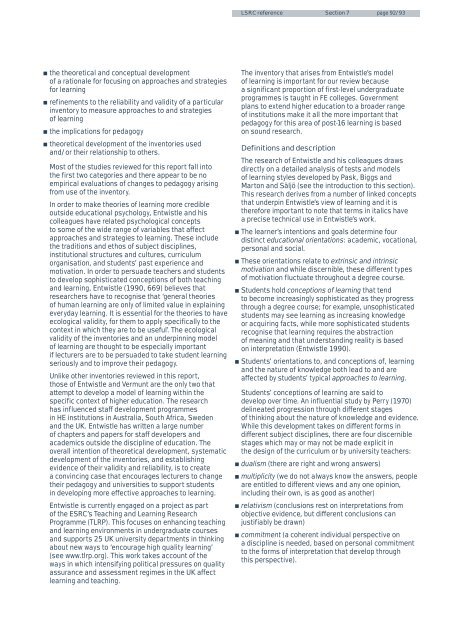learning-styles
learning-styles
learning-styles
You also want an ePaper? Increase the reach of your titles
YUMPU automatically turns print PDFs into web optimized ePapers that Google loves.
LSRC reference Section 7<br />
page 92/93<br />
the theoretical and conceptual development<br />
of a rationale for focusing on approaches and strategies<br />
for <strong>learning</strong><br />
refinements to the reliability and validity of a particular<br />
inventory to measure approaches to and strategies<br />
of <strong>learning</strong><br />
the implications for pedagogy<br />
theoretical development of the inventories used<br />
and/or their relationship to others.<br />
Most of the studies reviewed for this report fall into<br />
the first two categories and there appear to be no<br />
empirical evaluations of changes to pedagogy arising<br />
from use of the inventory.<br />
In order to make theories of <strong>learning</strong> more credible<br />
outside educational psychology, Entwistle and his<br />
colleagues have related psychological concepts<br />
to some of the wide range of variables that affect<br />
approaches and strategies to <strong>learning</strong>. These include<br />
the traditions and ethos of subject disciplines,<br />
institutional structures and cultures, curriculum<br />
organisation, and students’ past experience and<br />
motivation. In order to persuade teachers and students<br />
to develop sophisticated conceptions of both teaching<br />
and <strong>learning</strong>, Entwistle (1990, 669) believes that<br />
researchers have to recognise that ‘general theories<br />
of human <strong>learning</strong> are only of limited value in explaining<br />
everyday <strong>learning</strong>. It is essential for the theories to have<br />
ecological validity, for them to apply specifically to the<br />
context in which they are to be useful’. The ecological<br />
validity of the inventories and an underpinning model<br />
of <strong>learning</strong> are thought to be especially important<br />
if lecturers are to be persuaded to take student <strong>learning</strong><br />
seriously and to improve their pedagogy.<br />
Unlike other inventories reviewed in this report,<br />
those of Entwistle and Vermunt are the only two that<br />
attempt to develop a model of <strong>learning</strong> within the<br />
specific context of higher education. The research<br />
has influenced staff development programmes<br />
in HE institutions in Australia, South Africa, Sweden<br />
and the UK. Entwistle has written a large number<br />
of chapters and papers for staff developers and<br />
academics outside the discipline of education. The<br />
overall intention of theoretical development, systematic<br />
development of the inventories, and establishing<br />
evidence of their validity and reliability, is to create<br />
a convincing case that encourages lecturers to change<br />
their pedagogy and universities to support students<br />
in developing more effective approaches to <strong>learning</strong>.<br />
Entwistle is currently engaged on a project as part<br />
of the ESRC’s Teaching and Learning Research<br />
Programme (TLRP). This focuses on enhancing teaching<br />
and <strong>learning</strong> environments in undergraduate courses<br />
and supports 25 UK university departments in thinking<br />
about new ways to ‘encourage high quality <strong>learning</strong>’<br />
(see www.tlrp.org). This work takes account of the<br />
ways in which intensifying political pressures on quality<br />
assurance and assessment regimes in the UK affect<br />
<strong>learning</strong> and teaching.<br />
The inventory that arises from Entwistle’s model<br />
of <strong>learning</strong> is important for our review because<br />
a significant proportion of first-level undergraduate<br />
programmes is taught in FE colleges. Government<br />
plans to extend higher education to a broader range<br />
of institutions make it all the more important that<br />
pedagogy for this area of post-16 <strong>learning</strong> is based<br />
on sound research.<br />
Definitions and description<br />
The research of Entwistle and his colleagues draws<br />
directly on a detailed analysis of tests and models<br />
of <strong>learning</strong> <strong>styles</strong> developed by Pask, Biggs and<br />
Marton and Säljö (see the introduction to this section).<br />
This research derives from a number of linked concepts<br />
that underpin Entwistle’s view of <strong>learning</strong> and it is<br />
therefore important to note that terms in italics have<br />
a precise technical use in Entwistle’s work.<br />
The learner’s intentions and goals determine four<br />
distinct educational orientations: academic, vocational,<br />
personal and social.<br />
These orientations relate to extrinsic and intrinsic<br />
motivation and while discernible, these different types<br />
of motivation fluctuate throughout a degree course.<br />
Students hold conceptions of <strong>learning</strong> that tend<br />
to become increasingly sophisticated as they progress<br />
through a degree course; for example, unsophisticated<br />
students may see <strong>learning</strong> as increasing knowledge<br />
or acquiring facts, while more sophisticated students<br />
recognise that <strong>learning</strong> requires the abstraction<br />
of meaning and that understanding reality is based<br />
on interpretation (Entwistle 1990).<br />
Students’ orientations to, and conceptions of, <strong>learning</strong><br />
and the nature of knowledge both lead to and are<br />
affected by students’ typical approaches to <strong>learning</strong>.<br />
Students’ conceptions of <strong>learning</strong> are said to<br />
develop over time. An influential study by Perry (1970)<br />
delineated progression through different stages<br />
of thinking about the nature of knowledge and evidence.<br />
While this development takes on different forms in<br />
different subject disciplines, there are four discernible<br />
stages which may or may not be made explicit in<br />
the design of the curriculum or by university teachers:<br />
dualism (there are right and wrong answers)<br />
multiplicity (we do not always know the answers, people<br />
are entitled to different views and any one opinion,<br />
including their own, is as good as another)<br />
relativism (conclusions rest on interpretations from<br />
objective evidence, but different conclusions can<br />
justifiably be drawn)<br />
commitment (a coherent individual perspective on<br />
a discipline is needed, based on personal commitment<br />
to the forms of interpretation that develop through<br />
this perspective).


